Agriculture
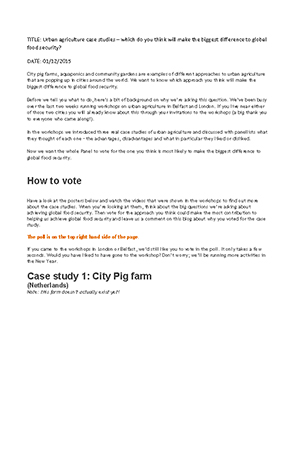
Food Futures Panel: Urban agriculture case studies – which do you think will make the biggest difference to global food security?
The GFS programme commissioned a panel of 600 members of the public to take part in engagement activities, exploring different aspects of food security research. This document details stimulus material for the urban agriculture dialogue.
(You can view PDF documents by downloading a PDF reader. We recommend using Google Chrome or Mozilla Firefox web browsers.)
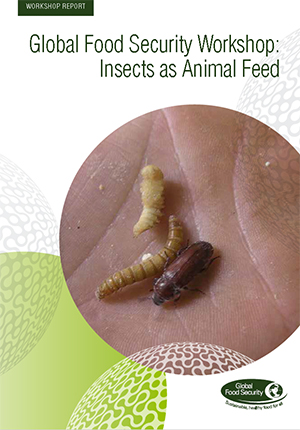
Global Food Security Workshop: Insects as Animal Feed
It is clear that a range of different approaches and sustainable sources will be needed to meet growing demands for protein-based animal feed, one option being use of insects. This workshop report examines the potential of insects as animal feed, exploring possible issues associated with rearing insects on an industrial scale, consumer acceptability and economic viability.
(You can view PDF documents by downloading a PDF reader. We recommend using Google Chrome or Mozilla Firefox web browsers.)
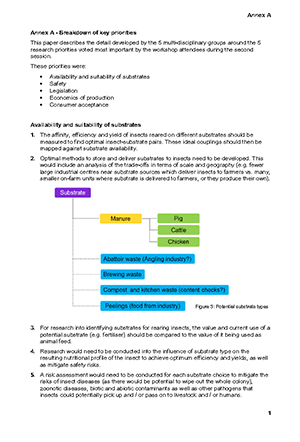
Global Food Security Workshop: Insects as Animal Feed – Annex A: Breakdown of key priorities
This annex to the Insects as Animal Feed workshop report breaks down ideas developed by the five multi-disciplinary groups around the five research priorities voted most important.
(You can view PDF documents by downloading a PDF reader. We recommend using Google Chrome or Mozilla Firefox web browsers.)
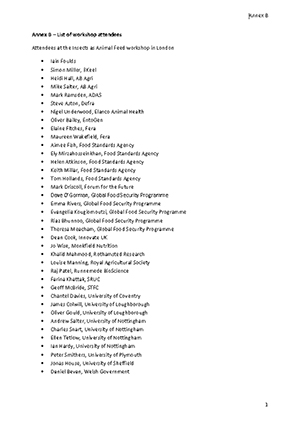
Global Food Security Workshop: Insects as Animal Feed – Annex B: List of workshop attendees
This document provides a list of delegates who attended the insects as animal feed workshop.
(You can view PDF documents by downloading a PDF reader. We recommend using Google Chrome or Mozilla Firefox web browsers.)
Taskforce findings were published in four reports: The taskforce Synthesis Report: Extreme weather and resilience of the global food system; Annex A: Climate and global crop production shocks; Annex B: Review of the responses to food production shocks; Annex C: Country Level Impacts of Global Grain Production Shocks.
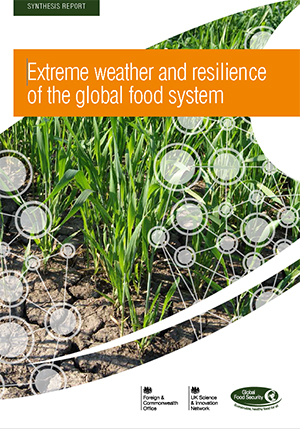
Extreme weather and resilience of the global food system
This synthesis report presents evidence that the global food system is vulnerable to production shocks caused by extreme weather, and that this risk is growing. Preliminary analysis suggests that the risk of multi-breadbasket failure from extreme weather will triple, going from a 1-in-100 year event to a 1-in-30 year event by 2040. A number of recommendations are made to improve resilience of the food system.
(You can view PDF documents by downloading a PDF reader. We recommend using Google Chrome or Mozilla Firefox web browsers.)
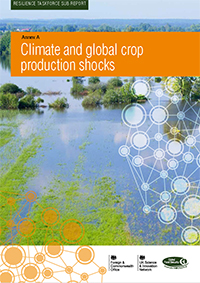
Resilience taskforce sub report – Annex A: Climate and global crop production shocks
This report presents a set of scenarios for weather-driven production shocks that are plausible in the present or near future climate. This work highlights the risks extreme weather poses to global food production, recommending further investigation into the meteorological teleconnections between major food production regions and the probability of coincident shocks in multiple breadbaskets.
(You can view PDF documents by downloading a PDF reader. We recommend using Google Chrome or Mozilla Firefox web browsers.)
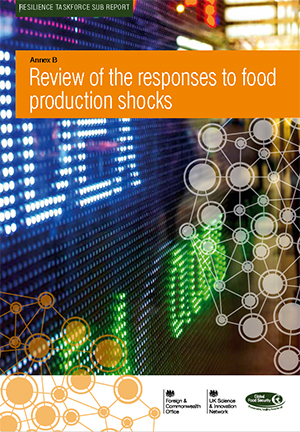
Resilience taskforce sub report – Annex B: Review of the responses to food production shocks
Impacts of extreme weather-related food production shocks can be heightened by protective policy responses that further amplify price volatility and market shocks. Through data analysis, literature reviews and expert interviews this report puts forward potential government and market responses to food production shocks in major crops that might create a more resilient food system.
(You can view PDF documents by downloading a PDF reader. We recommend using Google Chrome or Mozilla Firefox web browsers.)
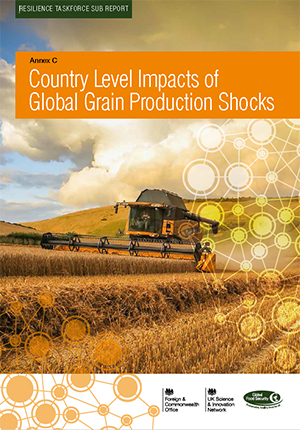
Resilience taskforce sub report – Annex C: Country Level Impacts of Global Grain Production Shocks
This report examines the impacts of potential extreme weather-related shocks to global grain production at a country level. Key recommendations include encouraging countries to take measures to reduce their exposure to grain production shocks, and more public-private partnerships to play a role in lessening the impact.
(You can view PDF documents by downloading a PDF reader. We recommend using Google Chrome or Mozilla Firefox web browsers.)

Extreme weather and resilience of the global food system
This document provides a visual summary of a weather-driven production shock scenario, fictional but plausible in the present or near future climate.
(You can view PDF documents by downloading a PDF reader. We recommend using Google Chrome or Mozilla Firefox web browsers.)
The network initiates under the auspices of the OECD Global Science Forum with eight signatory countries as full members.


